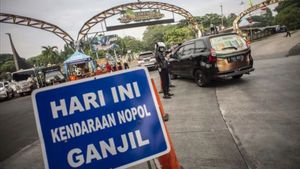JAKARTA - Member of the DPR from the PDIP faction, Masinton Pasaribu, highlighted the fate of a TKI from Bakuin Village, Kupang Regency, East Nusa Tenggara (NTT) with the initials DB who was tortured and worked without pay for more than nine years in Malaysia. This case adds to the long list of Indonesian migrant workers who are not treated humanely in the countries where they work.
"It is ironic that the charges of trafficking in persons, forced labor and maltreatment that were heard at the Kota Bahru Court of the State of Kelantan, Malaysia ruled the employer acquitted of all charges," Masinton told reporters on Monday, February 21. The legislator from the Central, South, and Overseas electoral districts, assessed that with the torture of Indonesian migrant workers in Malaysia still occurring, the Indonesian government must be firm in delaying the MoU (memorandum of understanding) sending Indonesian workers to Malaysia. "Moreover, Malaysia is currently in the international spotlight in cases of forced labor in the form of non-payment of salaries, withholding documents, prohibiting communication not only in the household sector, but also in other sectors such as plantations and manufacturing," said Masinton.
The former member of Commission III of the DPR said that Indonesia certainly respects the rule of law of the state of Malaysia. However, according to him, the Indonesian Embassy in Malaysia must be proactive in assisting and defending Indonesian migrant workers who are struggling to obtain justice.
"Don't let TKI who are victims of their employer's arbitrariness struggle alone. The state must be present to take legal action against Malaysia in accordance with the legal mechanism and legislation of the state of Malaysia," said the PDIP politician. The member of Commission XI DPR also asked the Indonesian government to follow the example of the Philippines in negotiating the delivery of its workforce. So, he said, workers get proper protection and rights when working in the country.
Moreover, Masinton added, the 1945 Constitution very clearly stipulates in Article 28A that everyone has the right to live and has the right to defend his life and life. So that it can be said that the Republic of Indonesia is obliged to protect the right to life and the right to defend the life and lives of all Indonesian citizens. "There are no exceptions, both inside and outside the territory of the Unitary State of Indonesia," he concluded. It is known that an Indonesian worker or TKI with the initials DB became a victim of forced labor in Malaysia. DB comes from Bakuin Village, Kupang Regency, East Nusa Tenggara.
According to the Indonesian Embassy in Kuala Lumpur, DB has worked for more than nine years. During that time he was not paid and experienced physical violence until his hearing was impaired.
Apart from working at the employer's house, DB is also employed in the employer's car repair shop. DB ran away from her employer's house at the end of October 2020. She could not stand forced labor for more than 15 hours a day without days off and physical violence.
DB also reported her employer to the Kelantan Manpower Office and the police in November 2020. The case was brought to court on charges of trafficking in persons accompanied by forced labor and abuse.
However, the decision of the Kota Bahru Court of Kelantan State acquitted the employer. "This decision is certainly very disappointing and does not provide justice to victims of forced labor and physical violence for years," said the Indonesian Ambassador to Kuala Lumpur Hermono in Kuala Lumpur, Saturday, February 19, 2022.
He said the Indonesian Embassy in Kuala Lumpur had asked the prosecutor to appeal the decision.
Based on information from the Kelantan Manpower Office on January 17, 2022, the Kota Bahru Court has acquitted the employer of all charges. "Through his lawyer, DB's employer once proposed a settlement out of court by paying the unpaid salary. However, the offer was rejected by DB and the Indonesian Embassy in Kuala Lumpur because it was far below the salary demands that the employer should have paid," he said.
In line with the criminal court process at the appellate level, the Indonesian Embassy in Kuala Lumpur has appointed a lawyer to sue DB's employer in civil court.
“We are not only demanding unpaid salaries, but also interest and compensation. This is important to provide a deterrent effect to employers," he said.
The English, Chinese, Japanese, Arabic, and French versions are automatically generated by the AI. So there may still be inaccuracies in translating, please always see Indonesian as our main language. (system supported by DigitalSiber.id)








